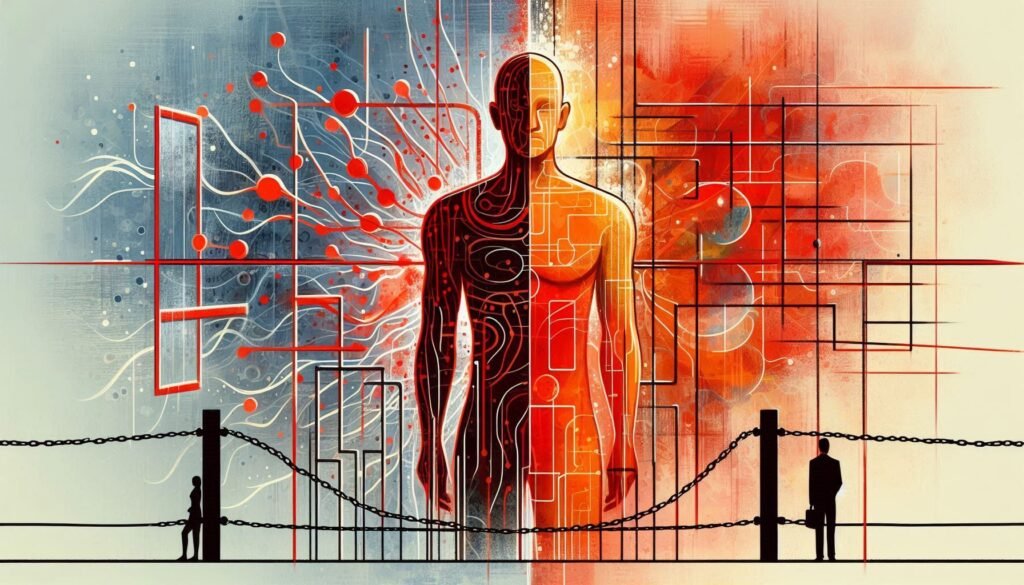Prejudice is a pervasive issue that continues to shape our societal interactions. It manifests in various forms, from subtle biases to overt discrimination, impacting countless lives daily. But what drives these negative attitudes? One compelling factor lies within the realm of personality psychology—specifically, neuroticism.
Neuroticism is often characterized by emotional instability, anxiety, and an inclination toward fearfulness. These traits can significantly influence how individuals perceive others and interact across social groups. Understanding the connection between neuroticism and prejudice opens new avenues for addressing intergroup conflicts and promoting tolerance.
This blog explores the intricate relationship between neurotic traits and prejudicial attitudes. By delving into psychological theories and research findings, we’ll uncover how cognitive processes shape bias while also examining potential strategies for fostering more inclusive environments. Join us as we unravel this complex dynamic that affects us all in different ways!

Defining Prejudice: Types and Manifestations in Society
Prejudice refers to preconceived opinions or attitudes about individuals based on their perceived group membership. This can manifest in various forms, often categorized into racial, ethnic, gender-based, and religious biases. Each type reveals underlying stereotypes that lead to unfair treatment and social division.
Racial prejudice is one of the most visible types, driving discrimination against people based solely on their skin color or ethnicity. Ethnic prejudices similarly target cultural backgrounds, often fueled by misunderstandings or historical tensions between groups.
Gender-based prejudice manifests through sexism and misogyny, affecting opportunities for women in many aspects of life. Religious bias can also create significant divides among communities and contribute to conflict—often rooted in a lack of understanding or fear.
These manifestations of prejudice are not just personal beliefs; they permeate societal structures like education, employment, and law enforcement. As such biases persist over time, they significantly impact social cohesion and individual well-being across diverse populations.
Neuroticism: A Key Personality Trait Influencing Social Attitudes
Neuroticism is a fundamental personality trait defined by emotional instability, anxiety, and heightened sensitivity to stress. Individuals high in neuroticism often experience negative emotions more intensely than others. This characteristic can significantly impact their social attitudes and behaviors toward different groups.
Research suggests that people with higher levels of neuroticism may be more prone to prejudice. Their tendency to perceive threats in social situations can lead them to adopt defensive attitudes towards those they view as different or unfamiliar. The fear of the unknown often exacerbates biases against out-groups.
Moreover, neurotic individuals are likely to exhibit greater emotional reactivity when faced with intergroup interactions. This reactivity can manifest as anxiety or discomfort around others who differ from themselves culturally or socially. Such feelings can contribute to reinforcing stereotypes and perpetuating prejudicial thoughts.
Understanding the link between neuroticism and prejudice is crucial for addressing societal issues rooted in bias. By exploring this connection, we can better grasp how personality traits shape our perceptions of others.
The Psychology of Fear and Uncertainty in Prejudice Formation
Fear is a powerful emotion that can shape our perceptions and behaviors. When people feel threatened, whether by change or unfamiliarity, they often respond with prejudice. This reaction stems from an instinctive desire to protect oneself and one’s group from perceived dangers.
Uncertainty amplifies this fear, leading individuals to cling more tightly to their beliefs and biases. The unknown becomes frightening, resulting in a tendency to stereotype those who are different. These cognitive shortcuts simplify complex social environments but often perpetuate existing prejudices.
Neuroticism plays a significant role in this process. Highly neurotic individuals experience heightened anxiety about uncertainties in life. As they navigate social situations filled with ambiguity, their predisposition toward negative thinking can fuel discriminatory attitudes against out-group members.
This psychological dynamic creates a cycle where fear breeds prejudice, which then reinforces feelings of uncertainty. Addressing these underlying fears is crucial for reducing bias and promoting healthier intergroup interactions among neurotic individuals.
Cognitive Processes: How Neurotic Thinking Patterns Fuel Bias
Neuroticism influences cognitive processes in ways that can exacerbate biases. Individuals high in neurotic traits often experience heightened anxiety and worry. This constant state of unease may lead them to overgeneralize or misinterpret social cues, fostering irrational beliefs about others.
These distorted perceptions can reinforce stereotypes. When faced with unfamiliar groups, neurotic individuals may fixate on negative traits rather than recognize the diversity within those groups. Their tendency to ruminate amplifies this issue, as they dwell on past experiences that confirm their fears.
Additionally, neurotics might engage in selective attention. They focus more on negative interactions while ignoring positive evidence about out-group members. Such cognitive filtering perpetuates a cycle of prejudice and bias.
Cognitive dissonance also plays a role here. Neurotics struggle when confronted with information that contradicts their preconceived notions, leading them to dismiss or rationalize away new insights instead of adjusting their views.
Emotional Reactivity: The Role of Neuroticism in Intergroup Anxiety
Emotional reactivity plays a significant role in how individuals perceive and interact with members of different groups. Neuroticism is characterized by heightened emotional sensitivity, leading to increased anxiety when faced with unfamiliar social situations. This trait can amplify feelings of discomfort around out-group members.
People high in neuroticism often experience intense fear or apprehension in intergroup contexts. These feelings may stem from past negative experiences or societal stereotypes, making them more susceptible to biases. Their instinctive response might be avoidance rather than engagement, reinforcing prejudiced attitudes.
Additionally, heightened anxiety can distort cognitive processing. When anxious, individuals may cling to simplistic views and stereotypes about others as a defense mechanism. This tendency limits their ability to see the richness of diverse perspectives.
Neurotic individuals might also misinterpret neutral behaviors from out-group members as threatening or hostile due to their emotional lens. Such reactions contribute directly to the perpetuation of prejudice, creating barriers that hinder meaningful connections between different communities.
Social Identity Theory: Neuroticism’s Impact on In-group Favoritism
Social Identity Theory explains how individuals categorize themselves and others into groups. This categorization often leads to in-group favoritism, where people show preference for their own group over outsiders. Neuroticism can significantly influence this tendency.
Individuals high in neuroticism may feel more insecure about their social standing. This insecurity drives them to seek validation from their in-group, reinforcing a sense of belonging and identity. The desire for acceptance can amplify biases against out-groups.
Moreover, neurotics might interpret ambiguous situations as threatening. Their heightened sensitivity to perceived slights or threats contributes to stronger allegiance towards the in-group while fostering negative views of those outside it.
This dynamic creates a cycle: neurotic individuals cling tighter to their group identity when faced with anxiety or uncertainty. As a result, the potential for prejudice becomes more pronounced, complicating intergroup relationships and increasing societal divisions.
Stereotype Threat and Its Relationship to Neurotic Traits
Stereotype threat refers to the risk of confirming negative stereotypes about one’s social group. This phenomenon can significantly impact performance and self-perception, particularly among individuals with neurotic traits. When faced with situations that highlight these stereotypes, neurotic individuals may experience heightened anxiety.
Neuroticism often involves a tendency towards negative emotions such as worry, fear, and self-doubt. These feelings can exacerbate the effects of stereotype threat. For example, when placed in an evaluative context, a neurotic person might become preoccupied with their performance relative to societal expectations.
This heightened level of anxiety can lead to decreased cognitive resources available for task completion. The constant worrying about reinforcing negative stereotypes distracts from focusing on actual performance. As a result, those high in neuroticism may underperform compared to their peers who are less affected by stereotype threats.
Moreover, the internalization of these stereotypes can further entrench prejudiced attitudes within oneself and toward others. The cycle perpetuates bias not just against out-groups but also creates barriers for personal growth and intergroup understanding.
The Influence of Media on Neurotic Individuals’ Prejudiced Attitudes
Media plays a significant role in shaping societal attitudes, often amplifying the biases held by neurotic individuals. Neuroticism is characterized by heightened sensitivity to stress and emotional instability, making these individuals more susceptible to media influence. When exposed to negative portrayals of certain groups, they may internalize these stereotypes and develop even stronger prejudiced beliefs.
Sensationalized news stories can evoke fear and anxiety, triggering existing insecurities in neurotic people. This fear can lead them to view out-group members as threats rather than allies or equals. As a result, media narratives that perpetuate division only deepen their biases.
Moreover, social media serves as an echo chamber where like-minded individuals gather. Here, prejudiced opinions are reinforced through likes and shares. The constant interaction with biased content fuels a cycle of negativity for those with neurotic traits.
This relationship between media consumption and prejudice highlights the importance of promoting balanced representations across platforms. It’s essential for both creators and consumers to be aware of how content impacts intergroup relations.
Reducing Prejudice: Strategies Tailored for Highly Neurotic People
Highly neurotic individuals often experience intense emotional reactions, making them more susceptible to prejudice. Tailoring strategies to address their unique needs can foster more inclusive attitudes. One effective approach is cognitive-behavioral therapy (CBT). This method helps individuals identify and challenge irrational thoughts linked to anxiety and bias.
Mindfulness practices also play a significant role in reducing prejudiced views among those with high neuroticism. Techniques such as meditation can cultivate awareness of automatic negative thoughts, allowing for greater emotional regulation. As a result, they may become less reactive in social situations.
Encouraging intergroup dialogue is another strategy that proves fruitful. Creating safe spaces for conversations about differences encourages empathy and understanding while reducing anxiety around out-group interactions.
Exposure therapy can be beneficial by gradually introducing highly neurotic people to diverse groups in controlled settings. This process helps desensitize them to their fears and biases while fostering positive experiences with others outside their comfort zone.
Promoting Intergroup Contact: Challenges and Opportunities for Neurotics
Promoting intergroup contact for individuals high in neuroticism presents unique challenges and opportunities. People with elevated levels of neuroticism often experience heightened anxiety, fear, and emotional instability. These traits can make initial interactions between different groups daunting. The fear of rejection or misunderstanding can inhibit these individuals from engaging openly with others.
However, fostering intergroup interaction is not just about encouraging participation; it also requires creating safe environments where neurotic individuals feel secure enough to express themselves without judgment. Structured programs that emphasize gradual exposure can be effective. For instance, starting with small group discussions allows participants to build trust over time.
Additionally, training facilitators to recognize signs of discomfort among highly neurotic participants is crucial. They should be equipped to diffuse tension and encourage positive exchanges when necessary.
On the flip side, successful intergroup contact can significantly reduce prejudiced attitudes in those who struggle with neuroticism. Positive experiences help reframe negative beliefs and promote empathy towards others. By focusing on strategies tailored specifically for this personality trait, we open pathways toward understanding and acceptance across diverse communities.
Addressing both the fears associated with neuroticism while providing supportive frameworks ultimately fosters a more inclusive society where prejudice has less room to thrive.


